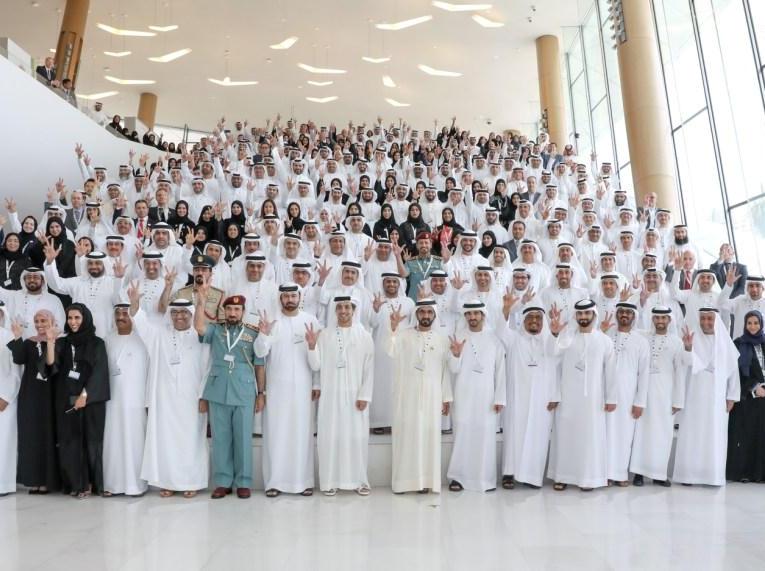Mohammed bin Rashid reviews progress of UAE Agenda 2021
By egor Tuesday, 11 April 2017 10:08 AM

WAM -- His Highness Sheikh Mohammed bin Rashid Al Maktoum, Vice President and Prime Minister of the UAE and Ruler of Dubai, said that the efficiency and success of the government is measured by it achievements and its ability to secure its goals on time.
"Under the leadership of His Highness Sheikh Khalifa bin Zayed Al Nahyan, President of the UAE, our government has introduced a model of government, which is based on a commitment to delivering results, and in transforming various challenges to opportunities. Our government is focused on rapid and steady accomplishments to achieve the goal of making the UAE one of the best countries in the world by 2021 – our nation’s 50th anniversary," said His Highness Sheikh Mohammed bin Rashid Al Maktoum.
His Highness was attending a government function at the Etihad Museum on Monday in Dubai, where he evaluated the progress made by the 36 executive teams assembled by the UAE Government last October 2016 to implement the National Agenda.
Closely evaluated by His Highness, the teams are tasked with working towards the Agenda’s objectives with 52 different national indices over the course of the next four years. The goal is to reach perfect scores (100 percent) across all indices and within six key sectors: healthcare, education, the economy, the environment and infrastructure, society, and security and the judiciary.
H.H. Sheikh Mohammed met with 500 members of the 36 executive teams, and was briefed on the results of each team’s respective national index, as well as the challenges they face and the initiatives and programmes they have launched to help implement the National Agenda. Furthermore, 96 national initiatives that seek to strengthen coordination between the local and federal governments were also announced.
H.H. Sheikh Mohammed was present as the ministers signed a charter, whereby they pledged to spare no effort in supporting the executive teams and monitoring the results of their respective indices to reach the objectives of the UAE Vision 2021.
High Highness said that signing the charter embodies the commitment of the Ministers to ensure that the results of the national indices will be achieved in line with the objectives of UAE Vision 2021.
"We directed to form teams from various government departments. These teams were instructed – along with all decision makers in the UAE – to intensify efforts in the upcoming period to achieve 100 percent of the National Agenda’s stated objectives by 2021. We met today six months since the inception of the teams to examine their results and projects, and to evaluate their progress,"H.H. Sheikh Mohammed added.
"We reviewed the results of the teams’ work and their plans and projects as well as their challenges in the short run. We must double the efforts with focus on changes that happen during the coming period. The year 2021 is only four years away," said His Highness.
Accompanying H.H. Sheikh Mohammed to Etihad Museum were H.H. Sheikh Hamdan bin Mohammed bin Rashid Al Maktoum, Crown Prince of Dubai, H.H. Sheikh Mansour bin Zayed Al Nahyan, Deputy Prime Minister and Minister of Presidential Affairs, and Mohammad bin Abdullah Al Gergawi, Minister of Cabinet Affairs and The Future.
H.H. Sheikh Mohammed bin Rashid Al Maktoum also launched the electronic "Government Performance Monitor", an integrated network developed to support the executive teams. It connects and overlays various national indices, evaluates government departments based on their policies and the amount of data they gather, assesses the quality of communication between the teams and international organisations, and examines the extent to which surveys conducted for the indices correlate with one another.
This allows these departments to prioritise their tasks, set clear plans, and compile the data necessary for the indices and then ensure it is picked up by international organisations.
The executive teams showcased their latest achievements in two-part presentations. The first covered the initiatives launched within important sectors and fields, such as to enhance the UAE’s competitiveness; projects to fight obesity in children and other illnesses such as cardiovascular diseases and cancer; monitoring national and international test results and evaluating schools; initiatives in sectors such as energy, water, and waste; the development aid portal; the official portal of the UAE; and initiatives that promote national identity and family cohesion.
The second part of the presentations introduced a road map for the 2017-2021 period, which includes initiatives to achieve the objectives of the National Agenda.
The executive team for the National and International Testing Index announced three initiatives, presented by Jameela bint Salem Al Muhairi, Minister of State for Public Education. The first calls for developing indices for all public and private schools in the country, to create a culture of shared responsibility and an environment that encourages creativity and innovation in schools.
The second recognises schools that have performed exceptionally well on international exams to stimulate constructive competition within the sector and encourage the exchange of successful practices. The third initiative calls for placing international tests under scrutiny to evaluate all public and private schools in the country.
The Executive Team of the Higher Education Index announced three initiatives, presented by Dr Ahmad bin Abdulla Humaid Belhoul AlFalasi, Minister of State for Higher Education. The first is a nation-wide study to identify the challenges that prevent students from enrolling in university and postgraduate studies, while the second calls for collaborating with the private sector to encourage citizens to pursue higher education. The third initiative consists of a national platform that introduces postgraduate programmes – and their requirements – in public and private universities in the UAE an abroad, in addition to listing organisations that offer scholarships for postgraduate studies.
The executive team for the Index for the Mortality Rate from Cancer and Cardiovascular Diseases presented an action plan to combat cancer, which consists of nine national programmes and initiatives to prevent the disease among UAE residents, increase their chance of recovery, and improve the treatments and the quality of life of cancer patients.
The team also introduced an array of initiatives that ensure the sustainability and continuous development of cancer treatment, including national screening programmes, innovative early detection services, an e-calling system for the public, establishing accredited centres for early detection of genetic cancers and those with genetic predispositions to contract the disease, establishing centres diagnostic and therapeutic services in hospitals across the UAE, and creating a national cancer registry.
The team also introduced an eight-initiative action plan to combat cardiovascular diseases. These promote prevention, early detection, and treatment methods for cardiovascular diseases. They also call for establishing an adequate infrastructure, perfecting training programmes for those working in the field, standardising tests, developing an app that raises awareness around the risks of such diseases, and offering incentives for stores and restaurants to serve healthy foods at reasonable prices.
The executive team for the Healthy Lifestyle Index launched an initiative titled the National Framework for Combatting Obesity in Children. In the presence of Abdul Rahman Bin Mohammed Al Owais Minister of Health and Prevention, Dr Hussein Abdul Rahman Al Rand, Assistant Undersecretary of Health Centres and Clinics Sector at the Ministry, presented the ground-breaking national initiative, which seeks to promote a healthy diet and physical activity – especially among schoolchildren – as well as providing care before and during pregnancy.
H.E. Lieutenant General Dhahi Khalfan bin Tamim, Deputy Chief of Police and Security in Dubai, showcased a plan for the index prepared by the executive team for the Security Index, which includes initiatives and programmes that seek to strengthen a sense of safety and security among members of the community. The initiative also seeks to ensure preparedness for cases of emergency; maintain low crime rates; enhance road safety; improve the infrastructure for forensics departments and security statistics; and develop a single system for combatting crime, as well as methods to curb rumours and redistribute emergency intervention units across the UAE.
The executive team for the Energy Index presented 10 initiatives to meet energy demand, encourage reliance on clean energy, implement green development projects, and reduce carbon dioxide emissions. The initiatives included the Blue Carbon Project, the Carbon Capture Facility, the Electricity Market Initiative, The National Programme for Energy Demand Management, and the Program for the Peaceful Use of Nuclear Energy in Electricity Production. The initiatives were presented by Suhail bin Mohammed Faraj Al Mazrouei Minister of Energy The executive team for the Water Index presented a roadmap consisting of nine initiatives that aim to ensure a holistic approach to water resource management in the UAE. The initiatives cover water demand management, rationing water consumption, establishing a water budget for the UAE, the Rainfall Programme, and the Masdar programme for the development of seawater desalination technologies using renewable energy sources. Additionally, there is the Strategic Water Storage Project and Water Security Strategy 2036. The presentation was given by the Minister of Energy.
Dr Thani Ahmed Al Zeyoudi, UAE Minister of Climate Change and the Environment, presented the project created by the executive team for the Waste Management Index – the Roadmap for Waste Management in the UAE. This includes national projects and a number of initiatives to encourage community members and institutions to reduce waste.
The initiatives include: building and operating a website that connects a waste producer with another party that could benefit from such waste as raw materials for a different industry. Beneficiaries range from commercial enterprises and industrial facilities, to government bodies and academic institutions.
The initiative "Ajyalna" engages public and private schools across the UAE in efforts to preserve the environment and reduce the ecological footprint of the academic community.




























Add new comment